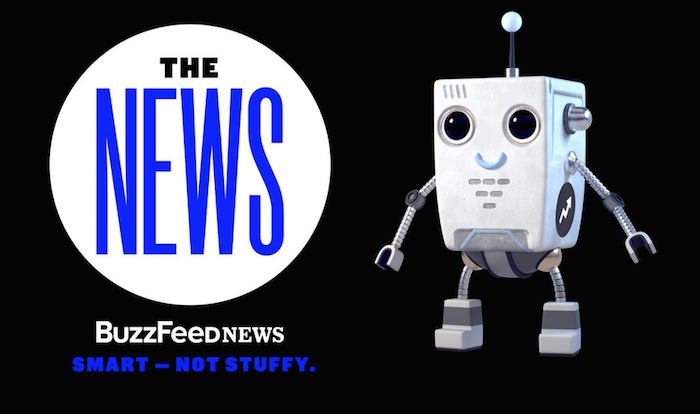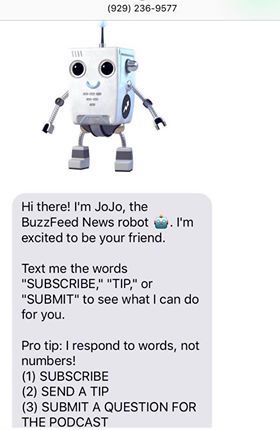
*techno beep*
“Did you hear that? That’s Jojo, our gender neutral robot.”
Jojo, a chatbot, is a cohost of BuzzFeed News’ new weekly news podcast, along with human Julia Furlan). The News, which will be released every Saturday, is designed to give those unacquainted with current events a manageable taste of the nutso news cycle, and also to amplify BuzzFeed reporters’ profiles (hmm, sounds similar to a certain forthcoming Netflix show). This includes talking through stories with reporters across the BuzzFeed newsroom, quizzing each other on fake news, and using Jojo to help push along BuzzFeed reporting for extra context.
“One of our goals has been to talk about the news in a way that invites our audience into the news cycle,” said Alex Laughlin, an audio producer on the team. “We’re trying to make it a little bit easier for people to be engaged.”
 The weekly show will feature a handful of segments with reporters and editors from the BuzzFeed newsroom, in a way that “gives people a space to talk through ideas,” explained producer Megan Detrie. This includes VP of news and programming Shani Hilton interviewing a reporter about one of BuzzFeed News’ top stories of the week, tech reporter Katie Notopoulos talking with another reporter about the the weird corners of the Web, a fake news true/false test with misinformation tracker Jane Lytvynenko, and a moment of calm with deputy world news editor Hayes Brown. And Jojo’s techno beep will help listeners follow along and invite them to suggest their so-called “stupid questions” (because there are no stupid questions) for an audience engagement segment.
The weekly show will feature a handful of segments with reporters and editors from the BuzzFeed newsroom, in a way that “gives people a space to talk through ideas,” explained producer Megan Detrie. This includes VP of news and programming Shani Hilton interviewing a reporter about one of BuzzFeed News’ top stories of the week, tech reporter Katie Notopoulos talking with another reporter about the the weird corners of the Web, a fake news true/false test with misinformation tracker Jane Lytvynenko, and a moment of calm with deputy world news editor Hayes Brown. And Jojo’s techno beep will help listeners follow along and invite them to suggest their so-called “stupid questions” (because there are no stupid questions) for an audience engagement segment.
In the preview episode of the show I listened to, Furlan occasionally invited listeners to text keywords to Jojo so that the bot, in turn, could send the link to the relevant article from the previous segment. (“Whomst” was the keyword for Jojo to send me the Twitter handles for the six reporters featured on the show.) Laughlin developed the SMS bot through John Keefe‘s bot-building Knight Center course earlier this year.
“When you’re talking about a story in a podcast, how do you get the listener to go from hearing you talk about it to reading it?” Laughlin said. Other podcasts have tried things like mentioning bit.ly links during the show or including links in newsletters about the episode, but there’s still some friction. Nearly 70 percent of podcast listeners last year listened on a smartphone, so sending a text to Jojo through your phone while listening is meant to be a streamlined experience. “What we’re trying to do with Jojo is allow people to be part of that audience without having to do 45 other things,” Furlan said.
This isn’t BuzzFeed’s first foray into audio attempts to engage its audience. Thirst Aid Kit, a BuzzFeed pop culture podcast about “dudes we fancy”, brings in readers with its #ThirstyThursdayGifParty on Twitter. And the Another Round podcast (which left BuzzFeed in December) frequently got listener contributions for the show via submitted voice memos or voicemails. The show partnered with the social audio app Rolltape to have a more streamlined submission process, but the relationship was short-lived: Rolltape shut down less than a month after Nieman Lab covered its announcement.“Sometimes we want to collaborate with someone and it sounds really cool, but social audio is always going to be a tough nut to crack,” Furlan said this week.
French startup Hack the Radio has also experimented with the chatbot-podcast relationship. Carine Fillot developed a Facebook Messenger chatbot to send listening recommendations and podcasts themselves to users, and the podcast can be streamed through an audio player within the same message. But BuzzFeed’s Jojo is more about maintaining a BuzzFeed personality in addition to breaking down the barriers of communicating with listeners about a podcast.For the “no stupid questions” audience-driven segment, Laughlin said they have received 150 questions in text and audio form to detangle topics from Michael Cohen to First Amendment rights to Syria. Those came through Laughlin’s January call-out post and from BuzzFeed News’ social media accounts, but Jojo will remind texters to send along any questions they might have as well. The team is looking forward to Jojo providing more details on the listeners’ experience than just ‘go leave us a review on iTunes’.
“Often, podcast audiences listen to the podcast and then they’re done,” Furlan said. “Jojo is a way for us to constantly get feedback on what our audience is thinking, how they’re engaging with the content, what they think about it, which stories they’re reading. The things we will learn from Jojo are things that we could learn about our audience in other ways, but this one is a little more granular.”